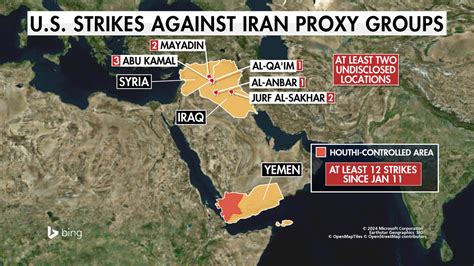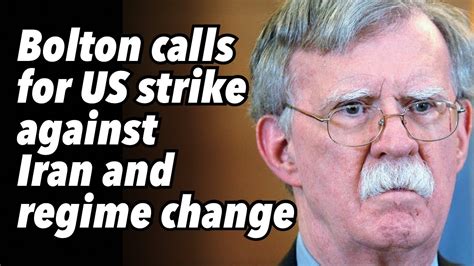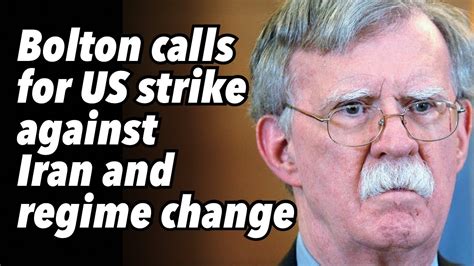
Following U.S. strikes in Iraq and Syria, former National Security Advisor John Bolton asserted that Iran is “in trouble” but insisted further action is necessary to deter future aggression from Tehran and its proxies.
Former National Security Advisor John Bolton, in reaction to recent U.S. military strikes against Iran-backed militias in Iraq and Syria, stated that Iran is “in trouble” but that these actions are insufficient to deter further aggression. Speaking in an interview, Bolton argued for a more comprehensive strategy to counter Iran’s destabilizing activities in the region. He emphasized that the U.S. needs to demonstrate unwavering resolve and employ a broader range of measures beyond retaliatory strikes to effectively contain Iran’s influence and prevent future attacks on American forces and interests. Bolton’s remarks underscore the ongoing debate within Washington regarding the most effective approach to managing the complex and volatile relationship with Iran.
Bolton, a long-time critic of the Iranian regime, believes the recent strikes are a reactive measure and do not address the root causes of Iran’s behavior. He argues that Iran interprets limited responses as a sign of weakness, emboldening them to continue their provocative actions. “They need to understand that there will be consequences for their actions, and those consequences need to be more than just a slap on the wrist,” Bolton stated. He advocates for a strategy that combines military deterrence with economic pressure and diplomatic isolation to compel Iran to alter its behavior.
The U.S. military conducted these strikes in response to a series of attacks targeting American personnel in the region. The Pentagon reported that the strikes targeted facilities used by Iranian-backed militias, including weapons storage sites and command-and-control centers. While the U.S. government has stated that the strikes were intended to be defensive in nature, Bolton and other foreign policy hawks argue that a more proactive approach is necessary to prevent future attacks and protect American interests.
Bolton’s perspective highlights a broader debate within the U.S. foreign policy establishment regarding the appropriate level of engagement with Iran. Some analysts believe that a strategy of containment and deterrence is the most effective way to manage the threat posed by Iran, while others advocate for a more diplomatic approach aimed at de-escalation and dialogue. The Biden administration has attempted to balance these competing priorities, seeking to deter Iranian aggression while also exploring opportunities for diplomatic engagement on issues such as the Iran nuclear deal.
However, Bolton remains skeptical of diplomatic solutions, arguing that Iran is not a reliable negotiating partner. He believes that the only way to compel Iran to change its behavior is through sustained pressure and a credible threat of military force. “They understand strength, and they respond to strength,” Bolton said. “We need to show them that we are serious about protecting our interests and that we are willing to use all available tools to do so.”
The recent U.S. strikes and Bolton’s reaction come at a time of heightened tensions in the Middle East. The ongoing conflicts in Syria and Yemen, as well as the political instability in Iraq and Lebanon, have created opportunities for Iran to expand its influence and support its regional proxies. The U.S. and its allies have been working to counter Iran’s activities, but the situation remains volatile and unpredictable.
Bolton’s assessment that Iran is “in trouble” reflects a view held by many within the U.S. national security community. Iran’s economy has been struggling under the weight of U.S. sanctions, and the country has faced internal unrest and political divisions. However, Iran has also demonstrated resilience and a willingness to challenge the U.S. and its allies in the region.
The debate over how to deal with Iran is likely to continue in the coming months and years. The U.S. faces a complex set of challenges in the Middle East, and there are no easy solutions. The choices made by the Biden administration will have far-reaching consequences for the region and for U.S. national security.
Expanded Context and Analysis
John Bolton’s hawkish stance on Iran is well-documented throughout his career in public service. His perspective is rooted in a deep distrust of the Iranian regime and a belief that only a posture of strength and unwavering resolve can effectively deter its aggressive behavior. Bolton’s views often contrast with those who advocate for diplomatic engagement and de-escalation, reflecting a fundamental difference in how to interpret Iran’s motivations and strategic goals.
Bolton’s critique of the recent U.S. strikes centers on the idea that they are merely reactive and do not address the underlying causes of Iran’s behavior. He argues that Iran’s support for regional proxies, its nuclear ambitions, and its ballistic missile program all pose significant threats to U.S. interests and require a more comprehensive and proactive response.
The concept of “deterrence” is central to Bolton’s approach. Deterrence, in the context of international relations, refers to the use of threats or military capabilities to dissuade an adversary from taking a particular action. Bolton believes that the U.S. needs to establish a credible deterrent against Iran by demonstrating its willingness to use force if necessary to protect its interests. This includes not only retaliatory strikes in response to attacks but also the potential for preemptive action to prevent Iran from acquiring nuclear weapons or further destabilizing the region.
Bolton’s call for a broader range of measures beyond military strikes reflects his understanding that the challenge posed by Iran is multifaceted. Economic pressure, in the form of sanctions, can weaken Iran’s ability to finance its regional activities and develop its military capabilities. Diplomatic isolation, by isolating Iran from the international community, can further constrain its options and increase its vulnerability.
The debate over the Iran nuclear deal is a key point of contention in the discussion about U.S. policy toward Iran. The Iran nuclear deal, formally known as the Joint Comprehensive Plan of Action (JCPOA), was an agreement reached in 2015 between Iran and a group of world powers, including the U.S., that aimed to limit Iran’s nuclear program in exchange for sanctions relief. Bolton was a staunch opponent of the JCPOA, arguing that it did not go far enough to prevent Iran from eventually developing nuclear weapons. He advocated for withdrawing from the deal and reimposing sanctions on Iran, a policy that was ultimately adopted by the Trump administration.
The Biden administration has sought to revive the JCPOA, but these efforts have been complicated by Iran’s continued advancements in its nuclear program and its refusal to fully cooperate with international inspectors. The future of the JCPOA remains uncertain, and the issue continues to be a source of tension between the U.S. and Iran.
The regional context is also crucial to understanding the complexities of the U.S.-Iran relationship. Iran’s support for proxies in Syria, Yemen, Iraq, and Lebanon has fueled conflicts and instability throughout the region. These proxies, such as Hezbollah in Lebanon and the Houthis in Yemen, have allowed Iran to project its power and influence beyond its borders.
The U.S. has been working with its allies in the region, including Israel and Saudi Arabia, to counter Iran’s activities and promote stability. However, the situation remains highly volatile, and there is a risk of further escalation. The recent attacks on American personnel in Iraq and Syria underscore the ongoing threat posed by Iran-backed militias.
Bolton’s assessment that Iran is “in trouble” reflects a recognition that the country faces significant challenges. Iran’s economy has been severely impacted by U.S. sanctions, leading to widespread discontent and protests. The country’s political system is also facing internal divisions, with some factions advocating for reform and others clinging to the status quo.
However, Iran has also demonstrated its resilience and its ability to adapt to challenging circumstances. The country has developed its own domestic industries and has sought to strengthen its ties with other countries, such as China and Russia. Iran has also continued to pursue its nuclear ambitions, despite international pressure.
In-Depth Analysis of Potential Strategies
To fully understand Bolton’s perspective, it’s crucial to delve deeper into the specific strategies he might advocate for beyond the general call for “more action.” These strategies can be broadly categorized into military, economic, diplomatic, and covert operations.
-
Military Strategies: Bolton likely favors a more robust military presence in the region as a deterrent. This could involve increased naval patrols in the Persian Gulf, more frequent joint military exercises with allies, and a greater willingness to use force in response to Iranian provocations. He might also support providing more advanced weaponry and training to U.S. allies in the region to enhance their ability to defend themselves against Iranian aggression. A key component of a military strategy would be contingency planning for a potential military strike against Iran’s nuclear facilities. While Bolton would likely view this as a last resort, he would argue that it’s essential to have credible plans in place to deter Iran from crossing the nuclear threshold. This also involves a clear articulation of red lines that Iran cannot cross without risking military retaliation.
-
Economic Strategies: Beyond the existing sanctions regime, Bolton might advocate for secondary sanctions targeting companies and countries that do business with Iran, even if those activities are not directly related to Iran’s nuclear program. The goal would be to further isolate Iran economically and deprive it of the resources it needs to fund its military and support its proxies. He might also support efforts to disrupt Iran’s illicit financial networks, which are used to evade sanctions and finance terrorist activities. This involves working with international partners to identify and shut down shell companies, front organizations, and money laundering schemes used by Iran.
-
Diplomatic Strategies: While Bolton is generally skeptical of diplomacy with Iran, he might support a strategy of “coercive diplomacy,” where the U.S. uses the threat of force or economic sanctions to pressure Iran to negotiate on terms favorable to the U.S. This would involve setting clear and specific demands for Iran to meet, such as dismantling its nuclear program, ending its support for regional proxies, and ceasing its ballistic missile development. The U.S. would need to be prepared to back up these demands with credible threats of action if Iran refuses to comply. Bolton would likely oppose any concessions to Iran in exchange for its cooperation, arguing that this would only embolden the regime and undermine U.S. credibility.
-
Covert Operations: Bolton might support the use of covert operations to disrupt Iran’s activities and weaken the regime from within. This could involve supporting opposition groups inside Iran, conducting cyberattacks against Iranian infrastructure, and sabotaging Iran’s nuclear program. Such operations would be highly sensitive and would need to be carefully calibrated to avoid escalating tensions or provoking a direct conflict. The risks involved in covert operations are significant, but Bolton might argue that they are necessary to counter the threat posed by Iran.
It is important to note that the implementation of these strategies would involve significant risks and challenges. A more aggressive approach to Iran could lead to escalation, conflict, and instability in the region. It could also alienate U.S. allies and undermine international efforts to address the threat posed by Iran. However, Bolton would likely argue that the risks of inaction are even greater, and that a failure to confront Iran’s aggression would only embolden the regime and increase the likelihood of a future conflict.
The Role of Public Opinion and Domestic Politics
U.S. policy toward Iran is not only shaped by strategic considerations but also by domestic politics and public opinion. Public opinion in the U.S. is divided on the issue of how to deal with Iran, with some Americans supporting a more hawkish approach and others favoring diplomacy and de-escalation.
The political climate in the U.S. also plays a significant role. The Republican Party has generally adopted a more confrontational stance toward Iran, while the Democratic Party has been more open to diplomatic engagement. The Biden administration has sought to balance these competing priorities, but it has faced criticism from both sides of the political spectrum.
Bolton’s views on Iran are widely shared within the Republican Party, and he has been a vocal advocate for a more hawkish approach. His arguments resonate with many Americans who are concerned about Iran’s nuclear ambitions and its support for terrorism. However, his views are also controversial, and he has faced criticism from those who believe that his approach is too bellicose and could lead to another war in the Middle East.
The debate over U.S. policy toward Iran is likely to continue for the foreseeable future. The choices made by the Biden administration will have far-reaching consequences for the region and for U.S. national security. It is essential to carefully consider all of the options and to weigh the risks and benefits of each approach.
Conclusion
John Bolton’s assessment that Iran is “in trouble” but that more action is needed reflects a long-standing view within the U.S. national security community that a more robust and comprehensive strategy is required to deter Iranian aggression and protect American interests. His call for a combination of military deterrence, economic pressure, and diplomatic isolation underscores the complexity of the challenge posed by Iran and the need for a multifaceted approach.
While the specific strategies that Bolton might advocate for carry significant risks and challenges, his perspective highlights the ongoing debate within Washington regarding the most effective way to manage the volatile relationship with Iran. The choices made by the Biden administration will have far-reaching consequences for the region and for U.S. national security, making it imperative to carefully consider all options and weigh the potential risks and benefits of each approach. The path forward will require a delicate balance of firmness and restraint, as well as a clear understanding of the complex dynamics at play in the Middle East.
Frequently Asked Questions (FAQ)
1. What was John Bolton’s role in the U.S. government, and why does his opinion on Iran matter?
John Bolton served as the National Security Advisor under President Donald Trump from 2018 to 2019. Prior to that, he held various positions in previous Republican administrations, including U.S. Ambassador to the United Nations. His extensive experience in foreign policy and his consistently hawkish stance on Iran make his opinions influential, particularly among conservatives and those who favor a more confrontational approach towards the Iranian regime. His views often shape the debate and influence policy discussions regarding Iran.
2. What are the “U.S. strikes” Bolton is referring to, and what was their purpose?
The U.S. strikes referenced in the article were military actions conducted against Iranian-backed militia groups in Iraq and Syria. According to the Pentagon, these strikes were a response to a series of attacks targeting American personnel in the region. The purpose of the strikes was to degrade the capabilities of these militia groups and deter them from conducting future attacks against U.S. forces and interests. The U.S. government characterized the strikes as defensive in nature.
3. What does Bolton mean when he says Iran is “in trouble,” and what evidence supports this claim?
When Bolton says Iran is “in trouble,” he is likely referring to the combination of economic pressures from U.S. sanctions, internal political unrest, and regional challenges that Iran is currently facing. The U.S. sanctions have significantly weakened Iran’s economy, leading to inflation, unemployment, and a decline in living standards. This has fueled public discontent and protests against the government. Additionally, Iran is facing challenges in its regional activities, including pushback against its proxies in Syria, Iraq, and Yemen.
4. What specific actions does Bolton believe the U.S. should take beyond the recent strikes to deter Iran?
While the article doesn’t detail every specific action Bolton would support, it suggests a multi-pronged approach that includes: stronger military deterrence (potentially including a more robust military presence in the region and more frequent joint exercises with allies), increased economic pressure (potentially through secondary sanctions), and diplomatic isolation (working to isolate Iran from the international community). He likely also supports covert operations to disrupt Iran’s activities and weaken the regime from within and coercive diplomacy, where the U.S. uses the threat of force or economic sanctions to pressure Iran to negotiate on terms favorable to the U.S.
5. How does Bolton’s view on Iran differ from the Biden administration’s approach?
Bolton’s view on Iran is generally more hawkish and confrontational than the Biden administration’s approach. Bolton favors a strategy of maximum pressure and deterrence, while the Biden administration has attempted to balance deterrence with diplomatic engagement, particularly regarding the Iran nuclear deal (JCPOA). The Biden administration has expressed a willingness to return to the JCPOA if Iran complies with its terms, while Bolton has consistently opposed the deal and advocated for a more aggressive approach to prevent Iran from acquiring nuclear weapons. The Biden administration is also trying to de-escalate tensions in the region through diplomatic channels while Bolton seems to favor actions that can show U.S. strength.









